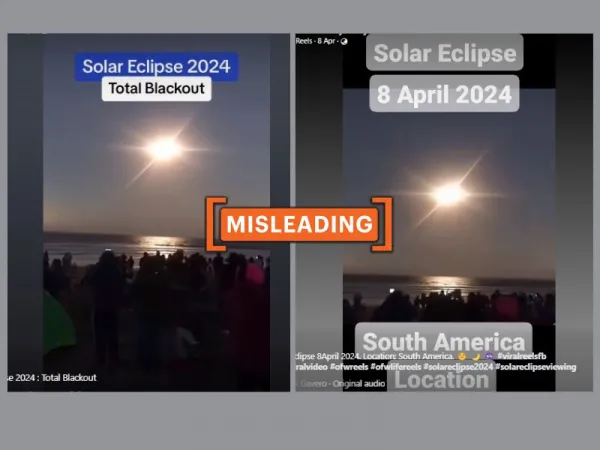By: Chandan Borgohain
April 10 2024
Video from 2019 passed off as 2024 solar eclipse sighting in South America

Social media posts share 2019 video as 2024 solar eclipse sighting in South America. (Source: Facebook/Modified by Logically Facts)
The Verdict Misleading
The viral clip has been online since July 3, 2019, and predates the recent solar eclipse that took place on April 8, 2024.
What is the claim?
A total solar eclipse, a rare celestial event during which the moon completely obscures the sun, occurred on April 8, 2024, with the path of totality crossing North America and captivating millions of people in some parts of the United States, Mexico, and Canada. Subsequently, a video purportedly showing the recent solar eclipse from a beach in South America has been widely circulating on social media.
On April 8, a Facebook user in the U.K. shared the video on the platform as a reel and wrote, "Solar Eclipse 8 April 2024. Location: South America."
The video has also been shared in the Indian regional language of Assamese with the same claim. One such Facebook post is archived here.
Screenshot of a Facebook post sharing the viral video. (Source: Facebook/Screenshot)
However, this viral clip predates the recent solar eclipse. It has been online since July 3, 2019, and social media posts claim that it shows the 2019 Chile solar eclipse captured in La Serena, Chile.
Was the April 8 eclipse visible from South America?
The April 8 total solar eclipse was visible from parts of Mexico, the United States, and Canada in North America. The 185 km-wide (115 mile-wide) band did not include any South American countries.
What else did we find?
Next, we performed a reverse image search and found that a Facebook page named ‘Space & Time,’ which shares content related to cosmology and astronomy, uploaded the same video on July 3, 2019. According to the caption, the video shows a solar eclipse in Chile.
Taking a cue from this, we found a video on X (formerly Twitter) by Marca Chile, a non-profit organization in Chile. The video features a compilation of solar eclipse visuals purportedly captured in Chile in July 2019. Timestamp 00:00 to 00:17 of the video shows the viral clip with overlaid text in Spanish that, when translated, read, "On Tuesday, July 2, northern Chile experienced a unique moment." Marca Chile credited the video to an Instagram user, '@brandon_gallardoo.'
The caption of the post by Marca Chile, shared on July 5, 2019, reads, "Do you want to relive the wonderful solar eclipse? These are some of the pictures left by the event captured by our followers."
We also found a YouTube video from July 5, 2019, that resembles the solar eclipse sighting in the viral clip. According to the title and description, it depicts the total solar eclipse event in La Serena on July 2, 2019. It also adds that the total eclipse was sighted for 2 minutes and 15 seconds at 4:39 p.m.
Another YouTube video with similar visuals also placed the event in La Serena, Chile, in July 2019.
According to The New York Times, a solar eclipse on July 2, 2019, was witnessed by millions of people residing in cities from La Serena, Chile, to San Juan, Argentina. The report added that La Serena was the first in South America to experience the peak eclipse or totality, at 4:38 p.m. attracting more than 300,000 visitors to watch the celestial spectacle.
The earliest versions of the viral clip we could find online were posted on July 3, 2019. A total solar eclipse was witnessed in La Serena in Chile the previous day, on July 2. However, we could not independently verify if the viral clip shows that, but as the clip in question clearly predates the solar eclipse on April 8, 2024, it is unrelated to the recent one.
The verdict
While the viral clip in question indeed shows a solar eclipse, the earliest version of the viral clip we could find online clearly predates the recent solar eclipse on April 8, 2024. Therefore, we have marked this claim as misleading.


